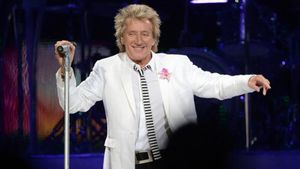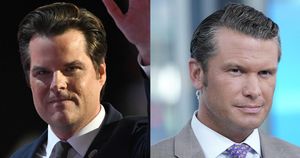Donald Trump’s 2024 presidential campaign enters an increasingly complex and contentious phase, as both supporters and critics brace themselves for the potential return of the former president to the White House. His rhetoric has stirred considerable debate, not only within the Republican base but also among undecided voters who hold the key to victory. Pundits are dissecting his strategy and the words he chooses, which some have labeled as ‘repugnant,’ but these very words might be part of a calculated effort to win hearts and minds.
Leading the charge on this analysis is Jonah Goldberg, a conservative commentator and former Fox News staple, who recently emphasized the political arithmetic behind Trump’s controversial rhetoric. According to his piece published in the Los Angeles Times, the stakes are clear: Trump’s approach may not resonate with traditional “persuadable voters” but could ignite the passion of “irregular voters” who have not consistently engaged with the electoral process. “If you’re not normally inclined to vote, policy differences aren’t going to motivate you to do so,” Goldberg noted. “But being told America’s very existence depends on it might.”
The former president clearly knows how to tap emotions and motivations at every level of the electorate. Trump’s inflammatory language, such as calling his adversaries ‘radical leftists’ and critiquing their governance vehemently, is portrayed as apocalyptic by his critics. Yet, Goldberg suggests this rhetoric might resonate with those voters who feel disenfranchised and disconnected from mainstream politics.
This phenomenon isn't new; strategic language aimed at energizing core supporters can be traced back through many successful political campaigns, but Trump’s approach has drawn both accolades and ire. His supporters may accept his extreme language as authentic, viewing him more as a fighter against perceived injustices rather than the divisive figure often portrayed by the media.
Political analysts point out how important it is for candidates to understand their electorate's psychology. Goldberg argued, “Persuadable voters” need reasons to align with candidates during elections, and they often seek someone who can connect with their immediate fears and aspirations. Trump has successfully identified issues such as immigration and economic security to rally his supporters, which plays directly to those emotions.
Interestingly, this strategic move thrusts Trump’s potential match-up against Vice President Kamala Harris under bright lights. Harris, as Biden's successor, is expected to draw support from established Democratic factions and movements advocating for social reform. But can she effectively counteract Trump’s populist wave? The narrative built around each candidate will significantly influence undecided voters whose preferences remain ambiguous.
While traditional metrics such as polling data indicate clear divisions among voters, it’s the discussions around Trump's ability to shape narratives and leverage rhetoric over factual debates where his influence can first be felt. Engagement may shift as irregular voters find newfound motivation to participate, particularly when they believe they are cast as saviors of their nation.
Ronald Brownstein, another political analyst, elaborates on this dynamic, stating, “The challenge is to mobilize those disenchanted with the system enough to show up at the polls.” His sentiments echo within political circles as they analyze historical voter behaviors influenced by how candidates engage with their audiences.
On the other hand, as Trump’s rhetoric continues to be under scrutiny, many observers question whether it alienates mainstream voters primarily focused on stability and civil discourse. The argument hinges on the belief whether voters will see through what some call unfounded wild stories and characterize them as mere sensationalism. The 2024 race could be defined more by its emotional resonance than direct policy proposals.
For Trump, engaging borderline voters is key. It reflects the broader struggle between engaging the base and appealing to those who may not identify as staunch Republican. This balancing act can define Trump’s approach—aggressive language to rouse loyalty contrasted with calls for inclusivity aimed at persuading undecided citizens.
The shadows of past election cycles loom large as they provide requisite lessons on the importance of timing and message crafting. Trump's 'Make America Great Again' motto encapsulated sentiments of nostalgia and dissatisfaction, but this time around it might skew toward ‘fight for America’ rhetoric.
Critical voices from within the Republican party also echo concerns. Some fear Trump's approach could turn off centrist voters, causing more harm than good. According to various reports, analysts warn of the long-term consequences of saturative divisiveness, which may lead to lower participation rates from more traditional voters, those who value civil political dialogue over combative rhetoric.
Yet, as the primaries approach, Trump's strategy might be less about winning voters over with policy specifics, and more about rousing their emotions, galvanizing them behind incendiary ideas, even if critics decry them as unfounded and extreme. The former president knows how to frame the narrative; it’s part of his playbook from years past.
With the election date on the horizon, all eyes are on how carefully voters navigate their choices. Will they be drawn to the excitement and energy of Trump’s staged rallies, or to more conventional terms of debate—reflecting on the issues at hand? The answer shines perhaps brightest on the undecided voters’ faces; who knows where they will land.
All may depend on whether Trump's growing popularity will reshuffle the ranks of the Republican primary challengers. Can others rise to the occasion, or is Trump's hold on the Republican base too strong to fracture? States like Iowa and New Hampshire will serve as early indicators of electoral sentiment, shaping campaign strategies moving forward.
It's illuminating to think how closely someone's political future can depend on their choice of words. From the roaring applause at rallies to the biting statements aimed at opponents, Trump's language and its reception will be pivotal as the race evolves. Can such rhetorical excesses convert casual observers? Will it embolden those who haven’t voted before to step up to the plate? Only time will tell, but political analysts are poised to monitor every shift and turn.



